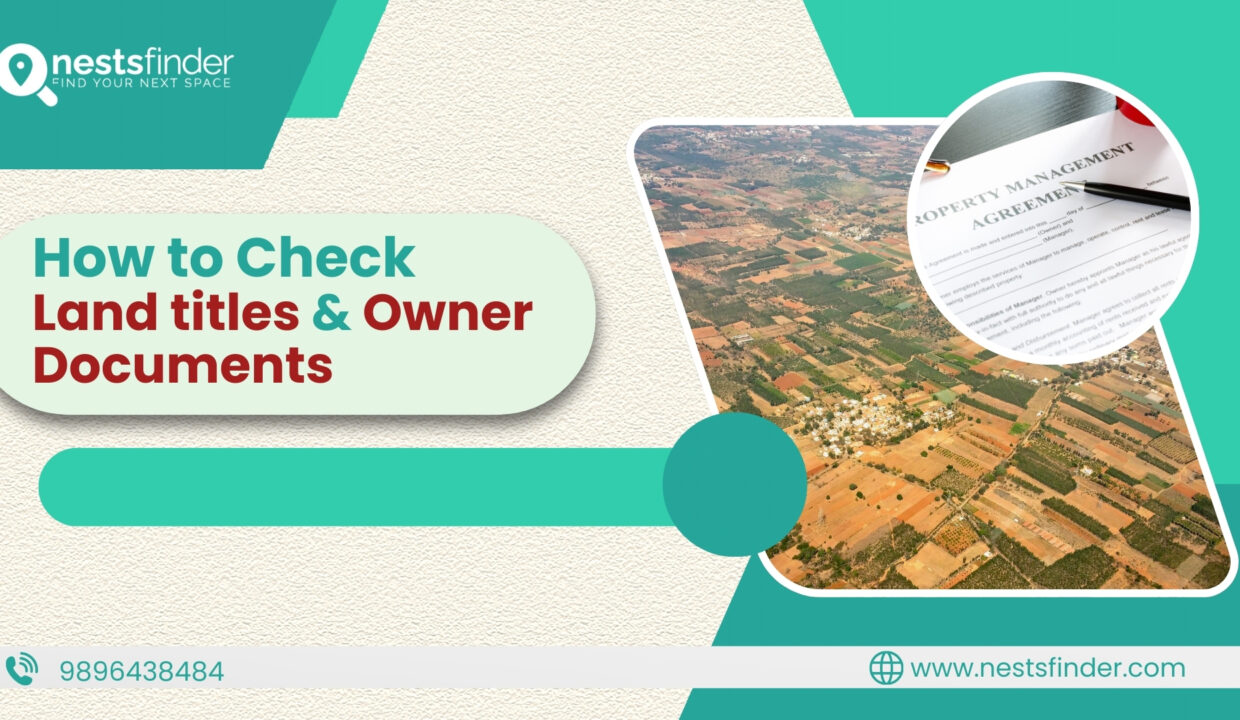How to Check Land Titles and Ownership Documents
Purchasing real estate is one of life’s largest purchases, but it can also be an exciting adventure. However, many people ignore or don’t fully comprehend the crucial necessity of confirming land titles and ownership documentation, which is concealed within this process. Verifying the legitimacy of a land title protects your financial investment as well as shields you from future legal issues. You can avoid major, expensive disagreements by knowing how to check land titles and ownership documents.
Key Documents That Establish Legal Ownership of Property
The foundation of any real estate transaction is the confirmation of land ownership. When land titles are clear, ownership is undeniable and supported by official records.
You risk purchasing land that is subject to legal debts, claims, or even fraudulent sales if you don’t have these guarantees. Extensive verification guarantees that you can enjoy and develop your property without worrying about future claims or conflicts and helps you establish complete rights to your land.
Common Reasons for Disputes Over Land Ownership
Land ownership disputes are surprisingly frequent and may result from unclear titles, improper paperwork, or even dishonesty. Complex legal issues might arise from boundary disputes, disputed transactions, inheritance claims, and unrecorded leases.
Sellers may occasionally try to sell real estate that is the subject of legal action or has unpaid debts. Understanding the typical problems that result in ownership disputes and preparing yourself with the appropriate paperwork and due research are the best ways to stay clear of these traps.
Types of Land Titles and Their Significance
Freehold vs. Leasehold Land Titles
It is essential to know if the land is freehold or leasehold. Complete ownership of the land and property is granted eternally by a freehold title, which permits the owner to sell, develop, or transfer the land as they see fit.
Leasehold titles, however, suggest the land is owned by another person, usually a government or institution, and is leased to the owner for a certain duration. You can learn about your legal rights and limitations with regard to the land by knowing the type of title.
Government Land vs. Private Land Titles
A title’s origin is also very important. Private land is held by private individuals or organizations, whereas government land is defined as areas owned or managed by municipal or state authorities.
It’s crucial to be aware of any development or land use limitations on government land before making a purchase. More development freedom is usually available on private property, although careful verification is necessary to prevent legal claims.
Essential Documents Required for Land Verification
- Title Deed: The most important document for verifying land ownership is a title deed, which lists the property’s legal description and the legitimate owner. Your initial course of action should be to check the title deed, which serves as a clear record of ownership and is frequently required for all upcoming land transactions.
- Sale Deed, Gift Deed, and Inheritance Documents: The transfer of title to the present owner is documented in these deeds. Property acquired through family succession is indicated by inheritance paperwork, a sale deed is for property that has been purchased, and a gift deed is for land that has been given without payment. A clear chain of ownership can be established by going over these documents.
- Property Tax Receipts and Utility Bills: Receipts for property taxes demonstrate the owner’s regular tax payments, which proves legitimate possession. Utility bills serve as further proof that the property is occupied or owned by the owner. When combined, these records validate real possession and lend the title deed legitimacy.
- Encumbrance Certificate: Any financial obligations, claims, or legal encumbrances on the property are listed in an encumbrance certificate. A clean title for the buyer is guaranteed by a clear encumbrance certificate, which indicates that there are no unpaid loans, liens, or lawsuits.
- Mutation Record: The transfer of ownership is reflected in land revenue records through mutation records. By establishing that the property has been formally transferred in government records, this document attests to the present owner’s legal possession of the land.
Online Resources for Land Record Verification
- Accessing Digital Land Records Through Government Portals: Land records are accessible to buyers through internet portals provided by many different governments. By making land titles, owner information, and encumbrance status easily accessible, these portals increase process transparency.
- How to Use Online Property Databases for Ownership Verification: Users can quickly verify ownership by searching digital databases by owner property ID. Learn how to use these tools to perform basic property inspections.
- Benefits and Limitations of Online Land Record Verification: While online verification is convenient, it may not always be comprehensive. Not all records are digitized, and sometimes errors occur, so verifying physical records remains important for accuracy.
To check online land records for Uttarakhand and Uttar Pradesh, use the links provided below:
Conclusion
Verifying land ownership is more than just a formality; it’s a precaution for one of your largest financial commitments. You can move on with assurance knowing that your ownership is legally sound by comprehending and putting into practice a rigorous verification process.
For more information about real estate, you can also explore the following articles:



